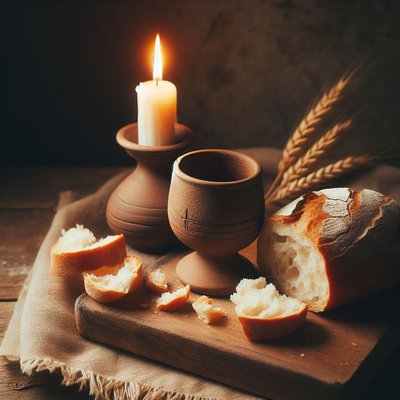Thoughts for the Day
Thursday, 17th April 2025: Maundy Thursday 2025
Last Supper Holy Communion 1 Corinthians 11 Lord's Supper The Mass Jesus Eucharist
Reading : Verses from 1 Corinthians, Chapter 11

The Institution of the Lord’s Supper
For I received from the Lord what I also handed on to you, that the Lord Jesus on the night when he was betrayed took a loaf of bread, and when he had given thanks, he broke it and said, ‘This is my body that is for you. Do this in remembrance of me.’ In the same way he took the cup also, after supper, saying, ‘This cup is the new covenant in my blood. Do this, as often as you drink it, in remembrance of me.’ For as often as you eat this bread and drink the cup, you proclaim the Lord’s death until he comes.
(Lectionary, New Revised Standard Version)
Thoughts
Today we remember our Lord's last supper held with his disciples, the night before his death. Our reading is from the Letter of St Paul to the Corinthians and is the earliest record of Jesus' actions and words at this meal. It was probably written around 53-54 CE, whereas the first Gospel account, by the writer of Mark's Gospel, does not seem to have appeared until a little later.
Christians have celebrated this night since then and given thanks for its institution, though we call it many different names - 'The Mass', 'Holy Communion', 'The Lord's Supper', 'The Eucharist', 'The Breaking of Bread' and the 'Divine Liturgy', among others. There are different understandings of what we do at this time, but there are also great similarities as I discovered in the 1980s as a Deaconess at Christchurch Abbeydale in Gloucester*. When this four-denominational church planned its first such service the leaders (Baptist, Methodist, United Reformed, and Church of England), sat down in a small room in silence, to write down what this service needed for their particular denomination. The amazing thing, we were almost shocked to realise, was that the only outward differences were in posture (did we sit, stand, or kneel at certain times) and how we received the bread and wine (or unfermented grape juice) after it had been blessed (eg from a paten and chalice with wafers, or from individual glasses and bread), not necessarily in words, though we all knew there were differences in our understanding of these words.
As we take the bread and wine on Maundy Thursday or on Easter Sunday, we celebrate a holy mystery, that through God's Grace and the power of the Holy Spirit, we are delivered from our sin. Today, let us give thanks to God, not for our differences, but for what we hold in common, and for our Lord's institution of this service.
* 'Christchurch' will celebrate their 40th anniversary this summer.
Prayer
Lord Jesus,
You taught Your disciples
at Your last supper with them,
to celebrate with bread and wine
and to continue doing this.
May the things we hold in common
draw Your people closer together,
and may we continue to pray for those unable to
celebrate this precious act
because of war,
or religious persecution,
or because they are housebound,
asking that at the same time we may never take
our ability to worship together for granted.
Amen.
You might like to play these:
- Eat this bread and drink this cup (Taize, by Emmaus Music)
- Let us break bread together
Or look at this modern video of Jerusalem, with reference to the past. Jesus and his disciples would have travelled this route from Bethany to the city each day and night during the last week of his life.